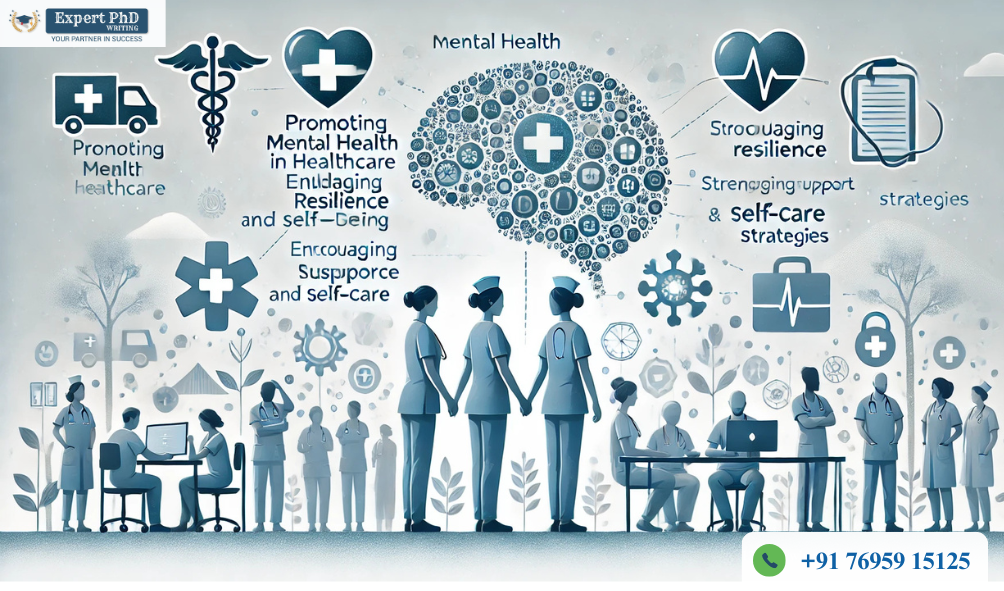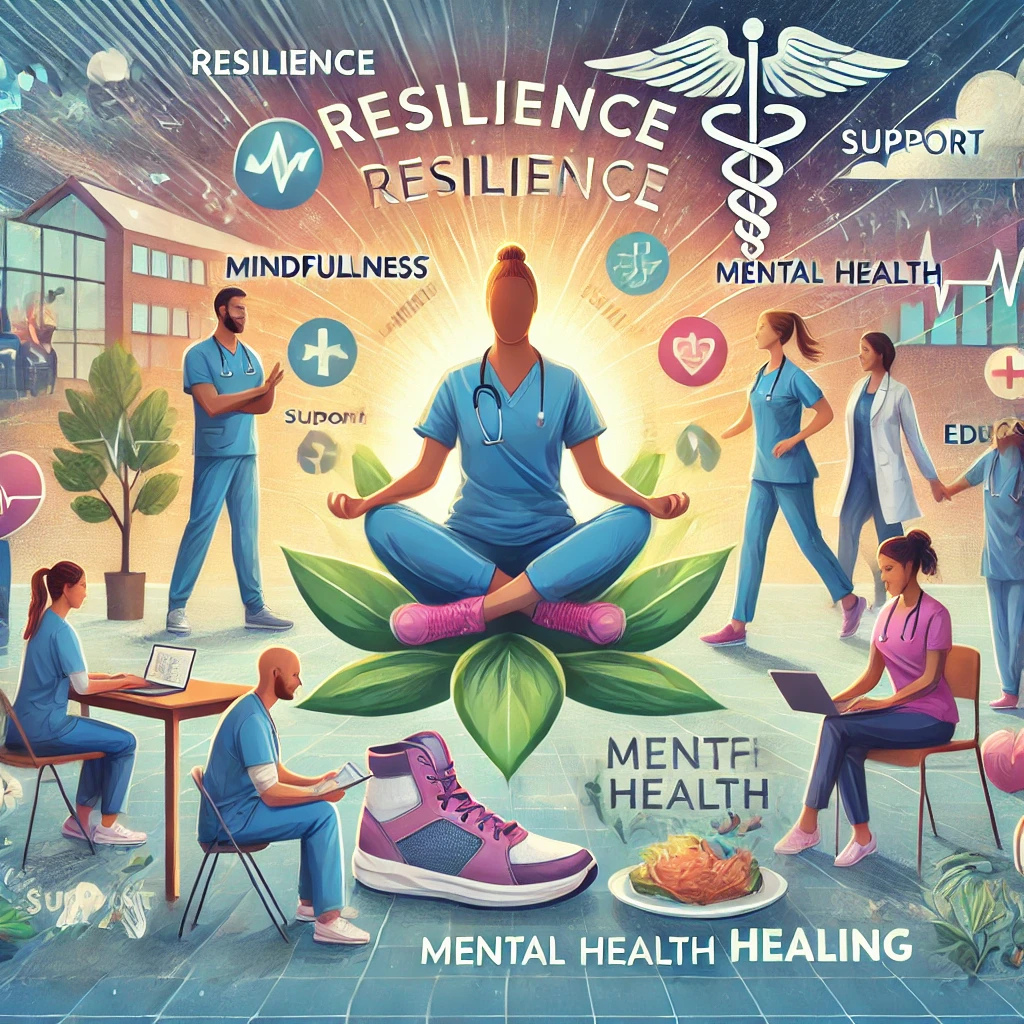
Mental Health in Healthcare Workers: Building Resilience in Nursing
Introduction
Introduce the issue of mental health in healthcare, focusing on nursing. Mention how healthcare workers, especially nurses, often face high-stress environments, long shifts, and the emotional toll of patient care. Highlight the importance of mental health in nursing as it affects both the well-being of the nurse and the quality of patient care.
In the fast-paced world of healthcare, mental health can sometimes take a back seat, particularly for those on the front lines. Nurses tasked with providing continuous care often bear the brunt of long shifts, emotional labor, and challenging situations. As people become more aware of the toll these demands take on mental health, it’s crucial to explore how nurses can build resilience to maintain both their well-being and the quality of care they deliver.
The Mental Health Crisis in Nursing
Discuss the common mental health issues affecting nurses, such as stress, burnout, anxiety, depression, and even PTSD. Mention recent studies or statistics, if possible, to provide a factual basis. It can also discuss how the COVID-19 pandemic has further intensified these challenges, shedding light on the psychological impact nurses face.
Example:
Nursing is a profession that demands both mental and physical endurance. Studies have shown that nurses experience higher rates of anxiety, burnout, and even PTSD compared to many other professions. According to the American Nurses Association, more than half of nurses report feeling overwhelmed, and a similar percentage experience symptoms of burnout (Rodney et al., 2022). The COVID-19 pandemic has only amplified these pressures, pushing nurses to their limits in terms of both workload and emotional resilience (Carter & Turner, 2021).

Why Resilience is Important in Nursing
Explain the concept of resilience and why it’s critical for nurses. Emphasize that resilience is more than coping; it’s about bouncing back and thriving despite challenges. Discuss how resilience benefits both nurses and patients, leading to improved job satisfaction, better mental health outcomes, and higher-quality patient care.
Example:
Resilience seems the ability to recover and adapt from trauma, adversity, or stress. In nursing, resilience is essential not just for survival but for thriving in a demanding work environment. Resilient nurses are better equipped to handle stress and maintain a positive outlook, which translates into enhanced patient care and satisfaction. Building resilience can also decrease the likelihood of burnout, helping nurses sustain their commitment to this demanding profession over the long term.
Strategies for Building Resilience
Offer practical strategies for nurses to build resilience. These could include:
- Self-Care Practices: Emphasize the importance of regular self-care, such as exercise, meditation, proper sleep, and balanced nutrition.
- Mindfulness and Meditation: Describe how mindfulness can help nurses stay present and reduce stress.
- Peer Support and Mentorship: Encourage building a support network within the workplace to share experiences and coping strategies.
- Professional Counseling or Therapy: Highlight the role of counseling or employee assistance programs in helping nurses process their experiences.
- Continuous Education and Skill Building: Explain how staying updated with medical knowledge can reduce anxiety and increase confidence.
Role of Healthcare Organizations in Supporting Mental Health
Discuss how healthcare organizations can support their nursing staff in building resilience. This might include implementing mental health programs, providing flexible scheduling, fostering a supportive workplace culture, and offering resources like counseling or wellness workshops.

Example:
While individual resilience is crucial, healthcare organizations also play a vital role in supporting their staff’s mental health (De Brier et al., 2020). Hospitals and clinics can offer mental health programs tailored to nurses, provide resources such as counseling services, and promote a supportive work environment. Flexible scheduling and sufficient breaks can make a difference in preventing burnout (Bernburg et al., 2019).
Conclusion
Summarize the key points and reinforce the importance of resilience in nursing. Encourage readers, whether they are healthcare workers or healthcare administrators, to prioritize mental health as a key component of the healthcare system’s overall effectiveness.
Building resilience in nursing is more than a personal endeavor; it’s a shared responsibility that involves both nurses and the organizations they work for. By prioritizing mental health, healthcare systems can not only improve the well-being of their nursing staff but also enhance the quality of patient care. As recognizing the challenges that nurses face, fostering resilience becomes not just beneficial but essential for a healthier, more compassionate healthcare environment.
References
- Bernburg, M., Groneberg, D. A., & Mache, S. (2019). Mental health promotion intervention for nurses working in German psychiatric hospital departments: a pilot study. Issues in mental health nursing. https://doi.org/10.1080/01612840.2019.1565878
- Carter, M., & Turner, K. M. (2021). Enhancing nurse manager resilience in a pandemic. Nurse Leader, 19(6), 622-624. https://doi.org/10.1016/j.mnl.2021.07.007
- Cooper, A. L., Brown, J. A., Rees, C. S., & Leslie, G. D. (2020). Nurse resilience: A concept analysis. International journal of mental health nursing, 29(4), 553-575. https://doi.org/10.1111/inm.12721
- De Brier, N., Stroobants, S., Vandekerckhove, P., & De Buck, E. (2020). Factors affecting mental health of health care workers during coronavirus disease outbreaks (SARS, MERS & COVID-19): A rapid systematic review. PloS one, 15(12), e0244052. https://doi.org/10.1371/journal.pone.0244052 [Mental Health]
- Rodney, T., Heidari, O., Miller, H. N., Thornton, C. P., Jenkins, E., & Kang, H. K. (2022). Posttraumatic stress disorder in nurses in the United States: Prevalence and effect on role. Journal of Nursing Management, 30(1), 226-233. https://doi.org/10.1111/jonm.13478 [PTSD]